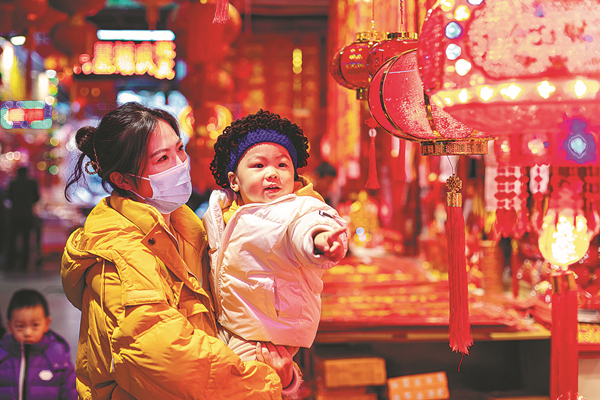Year-end reflects vitality in shopping

Lanterns attract consumers at a festival celebration product market in Hai'an, Jiangsu province. [Photo by Zhai Huiyong/For China Daily]
Chinese spent at a brisk pace over the recent New Year's Day holiday period, with an early rush to retail establishments, recreational activities and duty-free shops painting a sanguine picture for consumption in 2022, experts said.
Shoppers flocked to brick-and-mortar stores, driving sales across shopping malls, supermarkets and restaurants, as the COVID-19 prevention and control situation entered into a more normalized phase.
Total transactions via China UnionPay, the country's bank card association, hit a record 1.32 trillion yuan ($207.7 billion) between Jan 1 and Jan 3, the company said on Tuesday.
The number of transactions jumped 24 percent to 2.13 billion, while payments via UnionPay Mobile QuickPass, its proprietary mobile payment channel, saw a 71 percent rise in value and 65 percent jump in the number of transactions, it added.
In Beijing, retail sales recorded at key department stores, special shops, catering services and via e-commerce soared 18.8 percent year-on-year to 3.89 billion yuan from Jan 1 to Jan 3, said the Beijing Municipal Commerce Bureau. A 35 percent surge in consumer traffic was observed in 52 major commercial complexes in the city tracked by the bureau.
In Shanghai, offline shopping gained steam, raking in over 27 billion yuan between Dec 31, 2021 and Jan 2, up 12.8 percent from same period last year, said the Shanghai Municipal Commission of Commerce.
Some 20 million people visited the 36 key business districts in Shanghai tracked by the commission, a 90 percent rebound in traffic flow compared to pre-COVID levels, the government agency said.
Jason Yu, general manager of consultancy Kantar Worldpanel in China, said consumption remains healthy and has held up fairly well.
"Festival spending has long been the barometer of China's consumption market. The sound new year start indicates vitality in domestic consumption and restoration of consumer confidence as guided by policy directives to 'stabilize growth and stabilize consumption'," Yu said.
Movie theaters also gained traction among spectators, with some 11 million people spending the first day of the new year watching newly released blockbusters. Total box office receipts by the late hours of Jan 3 topped 1 billion yuan, said online ticket platform Dengta.
"We will see growing opportunities and rising new forms derived from local consumption, a lot of which occurs in offline scenarios," Yu said. "The good performance at the start of the year indicates a further shopping rebound for the upcoming Spring Festival."
The tropical island province of Hainan, which grants the Chinese consumers with an annual duty-free quota of 100,000 yuan each, enticed shoppers to spend big on such goods as cosmetics, wines and electronics.
On Jan 1 alone, offshore duty-free shopping in Haikou, the provincial capital, amounted to 162 million yuan, up 29 percent year-on-year and surging 129 percent compared with 2020 pre-pandemic levels, said Haikou Customs. Average per capita spending reached 8,917 yuan, adding 17.3 percent from last year and up 89.4 percent from 2020.
This is on the back of a booming duty-free business in Hainan as people increasingly see the island as a convenient alternative to overseas shopping destinations. Hainan's commerce department said the number of duty-free shoppers to the island increased 73 percent year-on-year, and the volume of duty-free purchases rose by 71 percent over the same period.
The island's 10 duty-free stores-which also sell non-duty-free items-booked sales of 60.17 billion yuan last year, up 84 percent from 2020.
Jonathan Yan, a principal at consultancy Roland Berger, estimated Hainan's annual offshore duty-free market to be worth over 200 billion yuan by 2025, and believes the addition of new duty-free malls will create economies of scale for people to spend on duty-free items.
In an interview with Xinhua News Agency last month, Ning Jizhe, deputy head of the National Development and Reform Commission, said China should give full play to domestic demand potential by expanding demand for bulk purchases, promoting new types of consumption including information technology and green consumption, advancing online and offline shopping and accelerating e-commerce and logistics systems in rural areas.

 China makes outstanding contributions to global energy transition
China makes outstanding contributions to global energy transition  Ningbo village inspires Malawi official
Ningbo village inspires Malawi official  A look at China's economic data in the first three quarters of 2024
A look at China's economic data in the first three quarters of 2024 


